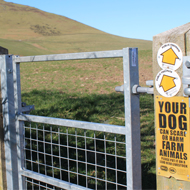
FOI figures show why owners need to keep dogs on lead, says sheep chief
A Freedom of Information request has revealed that the number of reported dog attacks on livestock has increased by 45 per cent in the past year.
The National Sheep Association (NSA), BVA and the Farmers Guardian are campaigning for dog walkers to keep their canines on a lead around livestock.
“Sheep worrying by dogs is a very serious problem for farmers, but we do not want to discourage walkers from enjoying the beautiful British countryside, only to do so responsibly and with consideration of the farming businesses that operate there,” said Phil Stocker, NSA, chief executive.
The figures, obtained by the Farmers Guardian, showed there were 1074 dog attacks on livestock reported to police in 2013. That compares to 739 incidents in 2012 and 691 in 2011.
It is also thought that around a quarter of attacks are not reported. A survey of sheep farmers carried out by NSA showed police were only informed of 73 per cent of incidents.
“The NSA survey shows the extent of the issue, which is not creating one-off cases on farms but a really persistent problem affecting animal welfare and causing stress and financial loss for the farmer," said Mr Stocker.
"While sheep deaths and serious dog bites are a very visible result of worrying, the invisible cost of stress, reduced conception rates, abortion and reduced daily liveweight gains are problems that we are trying to help educate dog owners about via our website.
“The sheep sector really wants to work with dog walkers to reduce the problem and help them understand the importance of always keeping their dog on a lead around livestock.”
BVA president Robin Hargreaves backeds the campaign.
“These figures make disturbing reading for anyone with an interest in animal welfare," he said.
"Our members see first hand the terrible consequences when dogs are not kept under control around livestock, especially during lambing season.
"Chasing and attacks can lead to serious injuries, fatalities and spontaneous abortion for sheep and other livestock. The results of these avoidable attacks are deeply distressing for the animal, the farmer and for the vet.
"We don’t want to discourage people from walking their dogs in the countryside. It’s great exercise and has health benefits for both owner and pet.
"However, responsible ownership, including keeping dogs on lead when necessary, is the cornerstone of good relationships between dog owners and farmers.
"It’s important to always know where your dog is in rural areas as they can cause a lot of damage in a short time. Most owners are well meaning but if a dog is out of sight they may not even be aware of the chasing or attack."
Owners are also asked to bag and remove their dog’s faeces when walking in the countryside as it can spread disease among livestock and wildlife.
The NSA has created a new area on its website specifically for dog walkers. The www.nationalsheepassociation.org.uk/dog-owners area provides top tips, legal advice and best practice for pet owners.
Emma Penny, editor of the Farmers Guardian said: “Our new ‘Take the Lead’ campaign aims to be a positive initiative, encouraging responsible dog ownership and asking owners to Take the Lead when it comes to safeguarding both their dogs and livestock.
"An astounding majority – 82 per cent of 1,379 dog owners we surveyed – believe they are in control of their dogs when they are loose. But even the best trained dog can have instinct take over, and that is what some owners don’t seem to realise or want to recognise.
“We would like to ask all dog owners to Take the Lead when they are around stock, and help reduce the risk of their pets chasing and even killing livestock.
"With more than 1,000 reported incidents in the last year, we need to find a way to reduce this devastation.”



 HMRC has invited feedback to its communications regarding the employment status of locum vets and vet nurses.
HMRC has invited feedback to its communications regarding the employment status of locum vets and vet nurses.